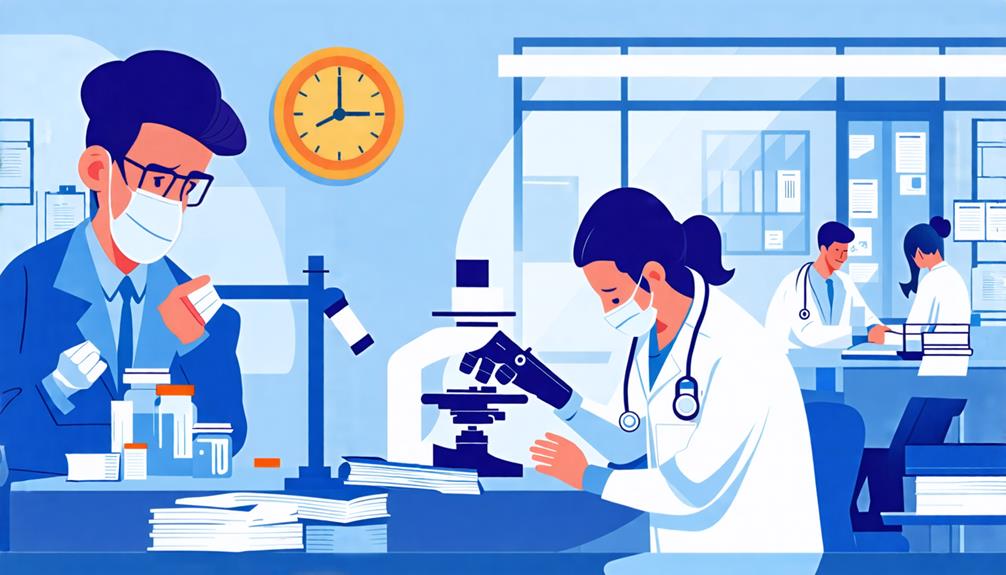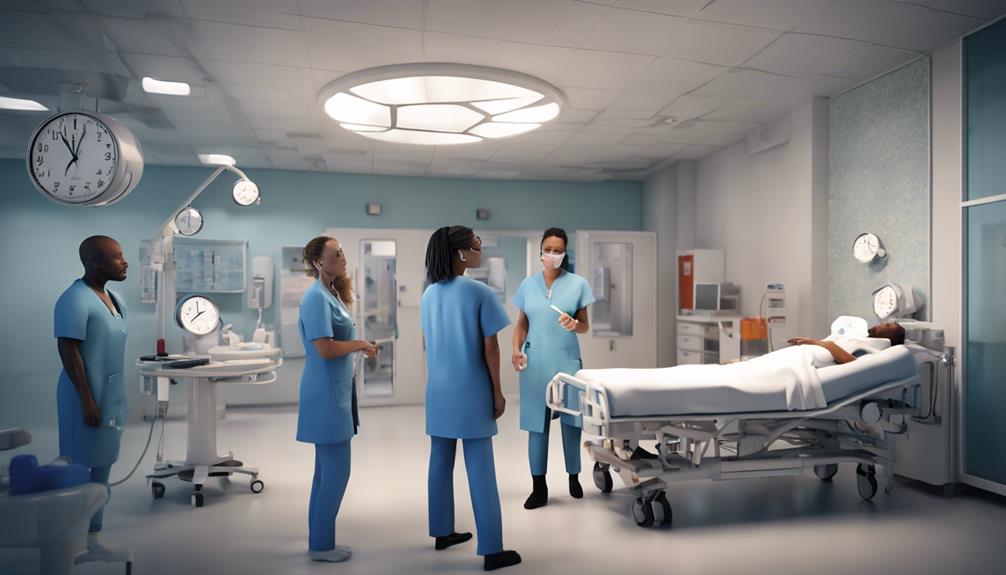
Yes, being a med tech can be quite stressful. You're often juggling complex tests, meticulous data recording, and precise calibration of lab equipment—all of which are critical for accurate diagnosis and patient care. The necessity to maintain both speed and accuracy can increase the pressure, and the emotional toll of handling life-and-death situations can lead to burnout. Moreover, the need for ongoing education to keep up with technological advancements adds another layer of stress. However, adopting effective coping strategies can significantly help in managing these challenges. There's much more to discover about how med techs handle and mitigate stress.
Understanding the Role of Med Techs

Med Techs, or medical technologists, play a crucial role in diagnosing and monitoring diseases by analyzing bodily fluids and tissue samples. You mightn't see them up front, but they're the backbone of medical diagnostics, hidden within the lab's sterile confines. They use complex instruments to test samples, helping doctors to pinpoint the nature and cause of illnesses. This isn't just about running machines; it's about precision and reliability, understanding the implications of every test result.
You're entrusted with sensitive information and the responsibility to deliver accurate results swiftly. Errors aren't just simple mistakes; they can be life-altering. Hence, the pressure to perform flawlessly is immense, and the need for continuous education is vital to stay abreast of technological advances. You're not only keeping pace with constant scientific advancements but also adapting to new diagnostic techniques that evolve at a breakneck speed.
Imagine handling patient samples that could confirm or rule out cancer, manage diabetes, or detect infectious diseases. Each sample isn't just a test tube; it's a person's health in your hands. This critical aspect of healthcare depends heavily on your expertise and attention to detail, making your role indispensable yet intensely demanding.
Daily Workload and Responsibilities
You'll face a daily workload that includes a diverse range of tasks, from conducting complex tests to recording precise data. Every action you take matters deeply, not just for the accuracy of the results, but for patient care outcomes. You might find yourself multitasking extensively, managing several tests simultaneously while ensuring that each one adheres to strict procedural guidelines.
Your responsibilities don't stop at testing. You're also in charge of calibrating and maintaining the lab equipment. This is crucial because any slight malfunction could skew test results significantly. You'll need to have a sharp eye for detail and a strong understanding of how your tools work.
Furthermore, you'll interact regularly with other healthcare professionals, discussing patient findings and collaborating on diagnoses. This part of your job requires excellent communication skills, as you'll often need to explain complex information simply and clearly.
Documentation is another critical aspect. You're responsible for recording all findings accurately in patient records. This meticulous attention to detail ensures that nothing is overlooked, which is vital for ongoing patient care and any future audits.
Handling these responsibilities daily can be demanding. It requires not just technical skills but also emotional resilience and adaptability.
Shift Patterns and Work Hours

Shift patterns in medical technology careers often vary, typically involving nights, weekends, and holidays. You might find yourself clocking in for a 12-hour night shift or covering a weekend when everyone else is off. This irregular schedule can be challenging as it often disrupts your body's natural rhythm and can affect your personal life.
You're also likely to be on your feet for most of these shifts, especially during busy periods, as hospitals and clinics don't adhere to a typical 9-to-5 schedule. This means your work hours can extend unexpectedly when emergencies arise or when there's a shortage of staff.
The variability doesn't stop there. In some roles, you might rotate between day and night shifts, which can make it hard for you to establish a consistent sleep pattern. This irregularity not only affects your physical health but can take a toll on your social life, as you might miss out on important family events or social activities.
Despite these challenges, understanding your shift pattern in advance can help you plan better and potentially mitigate some of the stress. It's crucial to find a balance where you can, ensuring you're not always the one sacrificing your off-hours.
Emotional Impact of Medical Errors
Dealing with medical errors can take a heavy emotional toll on you as a medical technologist. When you're directly involved in a situation where an error occurs, the immediate feeling might be shock, followed by a deep sense of guilt. You're trained to provide the utmost care, and any slip-up can feel like a monumental failure. The thought of causing potential harm to a patient can be overwhelmingly distressing.
You might also experience anxiety about the consequences of the error. There's often a fear of losing your job, facing legal action, or damaging your professional reputation. These worries can keep you up at night, replaying the scenario over and over in your mind, wondering what you could've done differently.
Furthermore, these experiences can lead to self-doubt about your skills and abilities. You might start questioning whether you're cut out for this field, despite all your hard work and dedication. This kind of self-criticism can be crippling, leading to a drop in your job performance and satisfaction.
Handling these emotions is challenging. They can cloud your judgment, making it harder to perform your duties with the confidence you once had.
Workplace Support and Resources

While confronting the emotional weight of medical errors is daunting, available workplace support and resources can significantly alleviate this burden. As a med tech, you'll find that the quality and availability of support systems can greatly influence your stress levels. Many facilities offer access to mental health professionals, peer support groups, and training programs designed to help you handle the pressures of your role.
Let's talk about these resources.
First, mental health services in your workplace are crucial. Counseling and therapy sessions can provide you with tools to manage stress and cope with the demands of your job. You're not alone, and it's okay to seek help.
Peer support groups are another asset. These groups provide a safe space where you can share experiences and solutions with colleagues who understand exactly what you're going through. Here, you can vent, exchange coping strategies, and bolster your resilience by learning from others.
Finally, ongoing training and educational opportunities can empower you. They keep you updated on the latest practices and technologies, boosting your confidence and competence. Remember, being well-prepared can reduce anxiety significantly.
Utilizing these resources not only helps you manage stress but also enhances your capability to provide the best care possible. Don't hesitate to use them; they're there for your benefit.
Comparing Stress Across Healthcare Jobs
Med techs often experience varying levels of stress compared to other healthcare professionals. You might find that nurses, for example, face intense pressure in managing patient care directly, dealing with emotional situations, and working long hours.
As a med tech, your stress isn't as closely tied to direct patient interactions but rather to the accuracy and timeliness of the tests you perform, which can significantly impact diagnostic decisions.
On the other hand, doctors typically endure high stress due to the critical nature of their decision-making and the complexities of the treatments they prescribe. Comparatively, your role as a med tech involves executing precise laboratory work which supports these medical decisions. While this is crucial, it's a different kind of pressure — more about precision and less about bedside manner.
Pharmacists, too, face their own stressors, balancing a meticulous need to dispense medication accurately against the backdrop of often hectic retail environments.
You'll find that while the stress in your job as a med tech is significant, it's largely centered on getting things right in the lab, rather than the frontline urgency faced by some of your peers in healthcare. Each role has its unique challenges, and recognizing this can help you manage your stress more effectively.
Frequently Asked Questions
How Does Med Tech Stress Affect Personal Relationships?
Your personal relationships might suffer if you're constantly stressed from work, as you'll have less energy and patience for loved ones, potentially leading to conflicts and strained communication.
What Are Common Coping Strategies for Med Tech Stress?
To manage your stress, you should try regular exercise, mindfulness practices, and maintaining a healthy work-life balance. It's also helpful to connect with colleagues who understand the unique pressures you're facing.
Can Med Techs Specialize to Reduce Stress?
Yes, you can specialize as a med tech to potentially reduce stress. Focusing on a specific area might streamline your workload and align more closely with your interests and expertise.
How Often Do Med Techs Switch Job Roles?
As a med tech, you might switch job roles every few years, depending on your workplace's needs, opportunities for advancement, or your interest in specializing in different areas of medical technology.
What Are Retirement Options for Stressed Med Techs?
You've got several retirement options as a med tech. You can explore traditional retirement plans, consider part-time positions to ease the transition, or even pursue consulting roles that leverage your expertise without full-time hours.
Conclusion
As a med tech, you're stepping into a high-stress role with a heavy workload and irregular hours. Yet, remember, you're not alone. Leverage workplace support and resources to manage the emotional toll of medical errors and demanding shifts.
While your job is challenging compared to other healthcare positions, embracing these supports can help you navigate the pressures effectively.
Stay connected with your colleagues, seek help when needed, and prioritize your well-being to thrive in this vital field.






